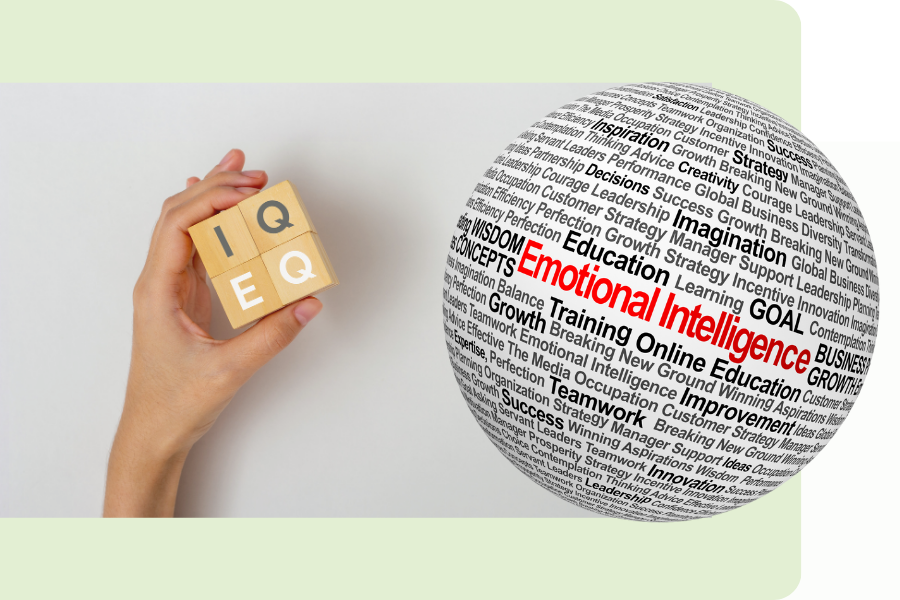
In the dynamic world of optometry, where precision, empathy, and effective communication converge, self-awareness within emotional intelligence stands as a key component for success. For you, cultivating self-awareness is not merely a professional enhancement but a crucial element for delivering exceptional patient care and fostering a harmonious work environment.
Understanding Self-Awareness in Emotional Intelligence
Emotional intelligence (EI) encompasses the ability to recognize, understand, and manage one’s own emotions while also recognizing and influencing the emotions of others. Self-awareness is the foundational component of EI. It involves having a clear understanding of one’s own emotions, strengths, weaknesses, values, and the impact of one’s behavior on others.
In practical terms, self-awareness enables you to navigate your emotional responses to daily challenges, whether it’s handling a difficult patient interaction, managing the pressures of a busy clinic, or collaborating with colleagues. By being aware of your emotional states, you can maintain professionalism, make informed decisions, and build stronger relationships with patients and coworkers.
Why Self-Awareness is Essential for Optometric Staff
1. Enhancing Patient Care
You frequently interact with patients who may be anxious about their vision health. Self-awareness allows you to recognize your own emotional responses, such as stress or impatience, and manage them effectively. By doing so, you can maintain a calm and reassuring demeanor, which is essential for building trust and rapport with patients. For example, a self-aware person can identify if they are feeling frustrated with a patient’s repeated questions and instead of showing irritation, they can consciously choose to respond with patience and understanding.
2. Improving Communication Skills

Effective communication is critical in optometry. Self-aware people are better equipped to express themselves clearly and empathetically. You can gauge how your words and tone affect patients and adjust your communication style accordingly. This is particularly important when explaining complex eye conditions or treatment options. A self-aware person can recognize if they are using overly technical language and switch to simpler explanations to ensure the patient comprehends the information.
3. Fostering a Positive Work Environment
Self-awareness contributes to a positive and collaborative workplace. When you understand your own emotions, you’re more likely to engage in constructive interactions with colleagues. You can navigate conflicts with empathy and respect, reducing workplace tension. For instance, if a disagreement arises over scheduling or patient care protocols, a self-aware individual can address the issue calmly, considering both their own perspective and that of their colleagues, leading to more effective resolution.
4. Personal and Professional Growth
Self-awareness is a catalyst for personal and professional development. By understanding your strengths and areas for improvement, you can seek opportunities for growth. This might involve pursuing additional training, seeking feedback, or reflecting on your interactions to continually enhance your performance. For example, a person who recognizes their discomfort with certain administrative tasks might take steps to improve their skills in that area, ultimately increasing their efficiency and job satisfaction.
Cultivating Self-Awareness

Developing self-awareness requires intentional effort and practice. You can start by regularly reflecting on your emotions and behaviors, seeking feedback from peers and supervisors, and engaging in mindfulness or self-assessment exercises. Techniques such as keeping a journal of daily interactions or participating in EI training programs can also be beneficial.
Conclusion
By honing this skill, you can enhance patient interactions, improve communication, contribute to a positive work environment, and embark on a path of continuous growth. Ultimately, self-awareness empowers eye care professionals to provide compassionate, effective care and thrive in their roles, benefiting both their patients and their practice.
Take the next step in your journey towards mastering emotional intelligence by exploring our continuing education resources at Emotional Intelligence Consulting Inc.. Start your learning journey today and empower yourself with the skills to excel both personally and professionally. Visit us now and transform your approach to patient care!

Jade Bodzasy
Jade Bodzasy, Founder of Emotional Intelligence Consulting Inc., is a dedicated Coach and Consultant for Optometric Practices. Her extensive background includes over 20,000 hours of expertise focused on customer relations, work structure refinement, training method development, and fostering improved work culture within Optometric practices.
Certified in Rational Emotive Behavior Techniques (REBT), Jade possesses a unique skillset that empowers individuals to gain profound insights into the origins of their behaviors, as well as those of others. Leveraging her certification, she equips optometry practices with invaluable resources and expert guidance to establish and sustain a positive, healthful, and productive work environment.






















 One important aspect of relationship management is the ability to create a feeling of comfort within your patients. When you can make a patient feel comfortable they will offer more information to you so that you can provide them with the best options for their care plan. We have to be diligent with reading the cues and listening to what patients are telling us in order to master our relationships with them.
One important aspect of relationship management is the ability to create a feeling of comfort within your patients. When you can make a patient feel comfortable they will offer more information to you so that you can provide them with the best options for their care plan. We have to be diligent with reading the cues and listening to what patients are telling us in order to master our relationships with them. To improve self-awareness and self-management, you can engage in reflective practices such as journaling, awareness exercises, and self-assessment tools on your own. These activities help them become more aware of your own emotions, triggers, and biases, allowing you to regulate your emotions effectively. Additionally, seeking feedback from an EI professional will give you valuable insights into areas for growth and improvement.
To improve self-awareness and self-management, you can engage in reflective practices such as journaling, awareness exercises, and self-assessment tools on your own. These activities help them become more aware of your own emotions, triggers, and biases, allowing you to regulate your emotions effectively. Additionally, seeking feedback from an EI professional will give you valuable insights into areas for growth and improvement. There is a patient that is wildly frustrated because they thought their glasses would be ready in two weeks time and they are not.
There is a patient that is wildly frustrated because they thought their glasses would be ready in two weeks time and they are not.